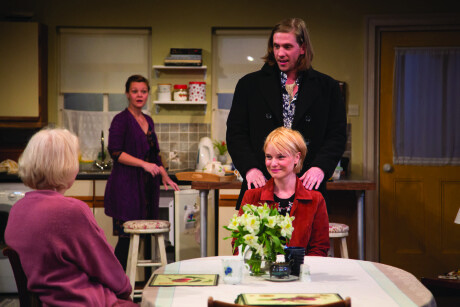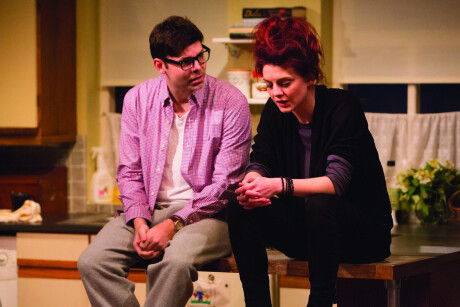“All happy families are alike; each unhappy family is unhappy in its own way,” as Leo Tolstoy famously said. Had Tolstoy seen Studio Theatre’s penetrating production of Deirdre Kinahan’s lacerating Moment—a knife-edged night of reopened old wounds—he might have added: “Each unhappy family has a meltdown in its own way.”

At the explosive end of Moment’s first act, the audience I watched the play with sat a long moment in shell-shocked silence. I doubt any of us knew what hit us.
Things don’t start out that way. At the beginning, Moment chit-chats and chirps along innocuously, quite unremarkably and for quite a while, as we are introduced to the members of a Dublin family. It is a family, we are to learn, that has a painful past that cannot be put behind them, and now is the first time they’ve all been together since the shocking incident that tore them apart some 15 years ago.
Teresa, the mother (Dearbhla Molloy), is on too many meds and has not enough memory left to keep track of them. Ciara (Caroline Bootle Pendergtast), one of Teresa’s two daughters, is a conventional mom with a fun-loving bloke of a hubby, Dave (Ciaran Byrne). But Teresa’s other daughter, Naimh (Emily Lanham) (pronounced Neev), arrives so tense and tightly wound she doesn’t even want to be around Fin (Avery Clark), the hapless co-worker and wannabe boyfriend she brought along.
What amps up the tension is the impending arrival of the sisters’ older brother, Nial (Peter Albrink). As a self-absorbed adolescent, he committed a horrible crime in his bedroom that he was sentenced to prison for. Since he served time, Nial’s life has been remarkably rehabilitated; he has become a successful abstract artist, exhibited in several galleries; he has the love of Ruth (Hannah Yelland), a beautiful and understanding woman who is also his art-world-savvy rep. For all practical purposes, Nial’s life is now happy and whole, and he has determinedly moved on. Naimh has decidedly not. She has never forgiven him.
It is to this kindling that Naimh’s bitter resentment of her older brother—for what he did, for what it did to her—sets a torch. And what makes Moment truly momentous is how Kinahan takes this incendiary combustion and makes it shine a bright light on family sexism.

Avery Clark and Emily Landham. Photo by Igor Dmitry.
Lots of playwrights have an “origin story,” a biographical narrative or incident that explains why they started writing for theater and how they discovered it was their art form, but Deirdre Kinahan’s must be among the most revealing. As she told Her, an Irish women’s magazine:
I first got into writing when myself and a friend Maureen set up the Tall Tales Theatre Company and we were both really interested in acting. I was acting for a couple of years, from around 1997 to 1999.
When I was acting I was also doing a bit of work with Ruhama Women’s Project. It provided education to women who had worked in prostitution all their lives in Dublin… I was in there teaching basic English literacy, computers and drama and I became very close to a couple of the senior women.
They then got interested in coming to my plays and one of them had the idea about writing a play about their lives so I said yes, I would bring a writer in and all the rest of it but they said we don’t want anyone else to write it but you. I said I’m not a writer but they said we trust you so I agreed to do it. That was my first play.
This genesis of a writing life is gendered: One cannot imagine a man being asked by women exiting the sex industry to tell their stories. But it is also an origin story that is gender-inequity conscious: One cannot imagine a woman in denial about male supremacy being entrusted by such women to tell their stories either.
This illuminating backstory of what became Kinahan’s acclaimed playwrighting career offers an insight into what she has achieved in Moment: Kinahan has a keen intuition for seeing the men in her play though the eyes of the women in her play, and for showing us exactly why the women see those men that way.
The main focus of Kinahan’s artful seeing is Nial, as he is viewed by his mother (who adores him) and his sister Niamh (who abhors him). Another focus is the deceased man whose portrait looms on the wall—the siblings’ father and Teresa’s husband—as we hear conflicting stories about why he died.
With a steady, unsettling gaze, Kinahan exposes the raw nerves of homespun sexism that fixes siblings for life in relation to one other and to themselves. Moment shows us a daughter who cannot escape living unhappily in the shadow of the favored son who hurt her…sisters whose father may have lost his life defending his son…grown women to whose own mother their prodigal brother still matters more….
To say this family drama is fascinating is an understatement.
Moment plays through April 24, 2016 at The Studio Theatre – 1501 14th Street, NW, in Washington, DC. For tickets, call the box office at (202) 332-3300, or purchase them online.





